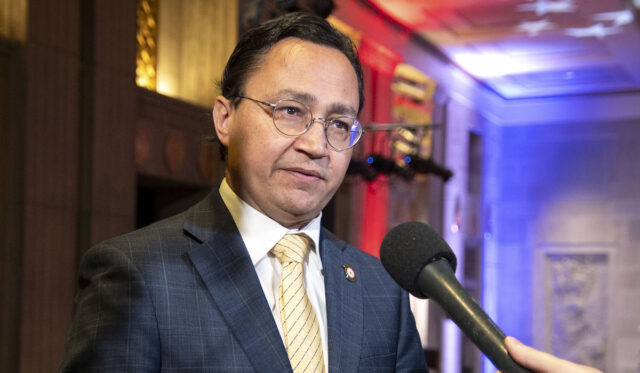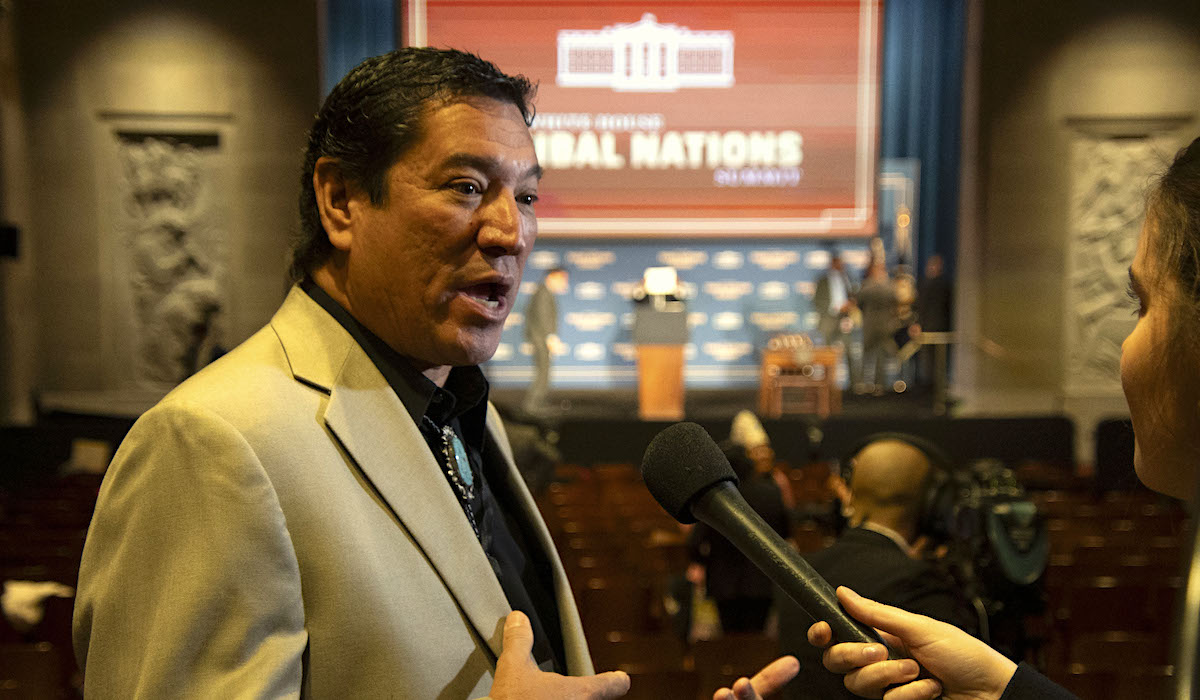

WASHINGTON — The beat of drums echoed off the walls of the Department of the Interior auditorium as members of the Native American Women Warriors Color Guard moved toward the stage with tribal flags in hand.
Just minutes before, the room was filled with laughter and boisterous conversation as friends and family gathered together. But as the traditional song filled the space, they fell quiet.
It was the beginning of the Biden-Harris administration’s third annual Tribal Nations Summit, and more than 100 Indigenous leaders from across the nation were gathered to hear President Joe Biden’s plan for strengthening relationships with tribal nations and advancing tribal sovereignty and self-determination.
This story was reported by Gaylord News, a Washington reporting project of the Gaylord College of Journalism and Mass Communication at the University of Oklahoma.
“It’s hard work to heal the wrongs of the past, change the course and move forward,” Biden said Wednesday at the summit. “But the actions we’re taking today are key steps into that new era of tribal sovereignty and self determination, a new era grounded in dignity and respect that recognizes your fundamental rights to govern and grow on your own terms.
“That’s what this summit is all about.”
The two-day event presented an opportunity for tribal leaders and top administration officials to come together to discuss important issues facing tribal communities, according to a White House fact sheet. Biden, who has voiced his commitment for supporting Indian Country since he took office, is the first president since Barack Obama to host a Tribal Summit.
‘Disinvestment in Indian Country leads to a great many ailments’

With members of his administration and tribal leaders standing behind him, Biden signed an executive order to reform federal funding and support for tribal nations. As he finished signing his name onto the document, the crowd erupted into cheers and applause.
In part, the new order requires federal agencies to ensure funding for tribes is accessible and equitable; creates The Tribal Access to Capital Clearinghouse, an online one-stop-shop where tribes and Native businesses can find and access grants; and directs the White House Council on Native American Affairs, the Office and Management and Budget, and the White House Domestic Policy Council to measure federal funding shortfalls for tribes and develop recommendations for necessary funding and programs, according to the fact sheet.
“The most important thing for tribes in Oklahoma, certainly from the Cherokee Nation standpoint, is making sure there’s a really efficient way to get funding to our programs,” said Chuck Hoskin Jr., principal chief of the Cherokee Nation.
Hoskin said the U.S. government has an obligation to fund certain programs and initiatives for Tribal communities, and that having to navigate so many hurdles or compete with states for federal funds goes against a “government-to-government relationship based on respect.”
Read the full
executive order
Gov. Reggie Wassana of the Cheyenne and Arapaho Tribes said oftentimes funds allocated to native communities never make it there, preventing them from making necessary infrastructure repairs or improvements on their land. Wassana said he hopes the Biden administration looks at the policies and regulations that make it difficult for tribes to get necessary federal money.
Wassana said a lack of funding and resources also contributes to the ongoing missing and murdered Indigenous people crisis, which was one of the topics discussed during the first day of the summit.
According to the Bureau of Indian Affairs, approximately 4,200 missing and murdered cases have gone unsolved in the U.S.
“It all comes down to funding,” Wassana said. “They don’t have enough funds to put those many (officers) out into the country to be in those areas where there’s probably a high rate of MMIP events.”
Hoskin shared Wassana’s concern, adding that the missing and murdered Indigenous people crisis is a big issue in Oklahoma and within the Cherokee Nation.
“Disinvestment in Indian Country leads to a great many ailments, including people that are disproportionately victims of violent crime,” Hoskin said. “It’s just the truth.”
Other recent funding developments
In 2021, Biden signed an executive order aimed at improving public safety and criminal justice for Native Americans and address the crisis of missing and murdered Indigenous people. This past year, the administration has continued efforts to implement this order by creating the Not Invisible Commission, MMIP Regional Outreach Program and a national plan to end gender-based violence, among other initiatives, according to a 2023 Progress Report for Tribal Nations released during this week’s summit.
The report, which outlines progress made in the previous year, noted more stable advance funding for the Indian Health Service and the signing more than 190 new tribal agreements to co-manage or co-steward federal lands and waters, a jump from the 20 agreements signed in 2022.
Additionally, through Biden’s Investing in America agenda, this year the Biden-Harris Administration has invested $45 billion — more than 15-years’ worth of the Bureau of Indian Affairs’ annual budget — in Indian Country, said Secretary of the Interior Deb Haaland.
Still, both the Biden administration and tribal leaders said the work is far from over to support native communities and advance tribal sovereignty and self-determination.
“We usher in a new era of relationship between our government and nation-to-nation relationships. We’ve made progress. But we know Indigenous communities still live in the shadows of the failed policies of the past,” Biden said. “That’s why I’m committed to working with you to write a new and better chapter in American history.”






















